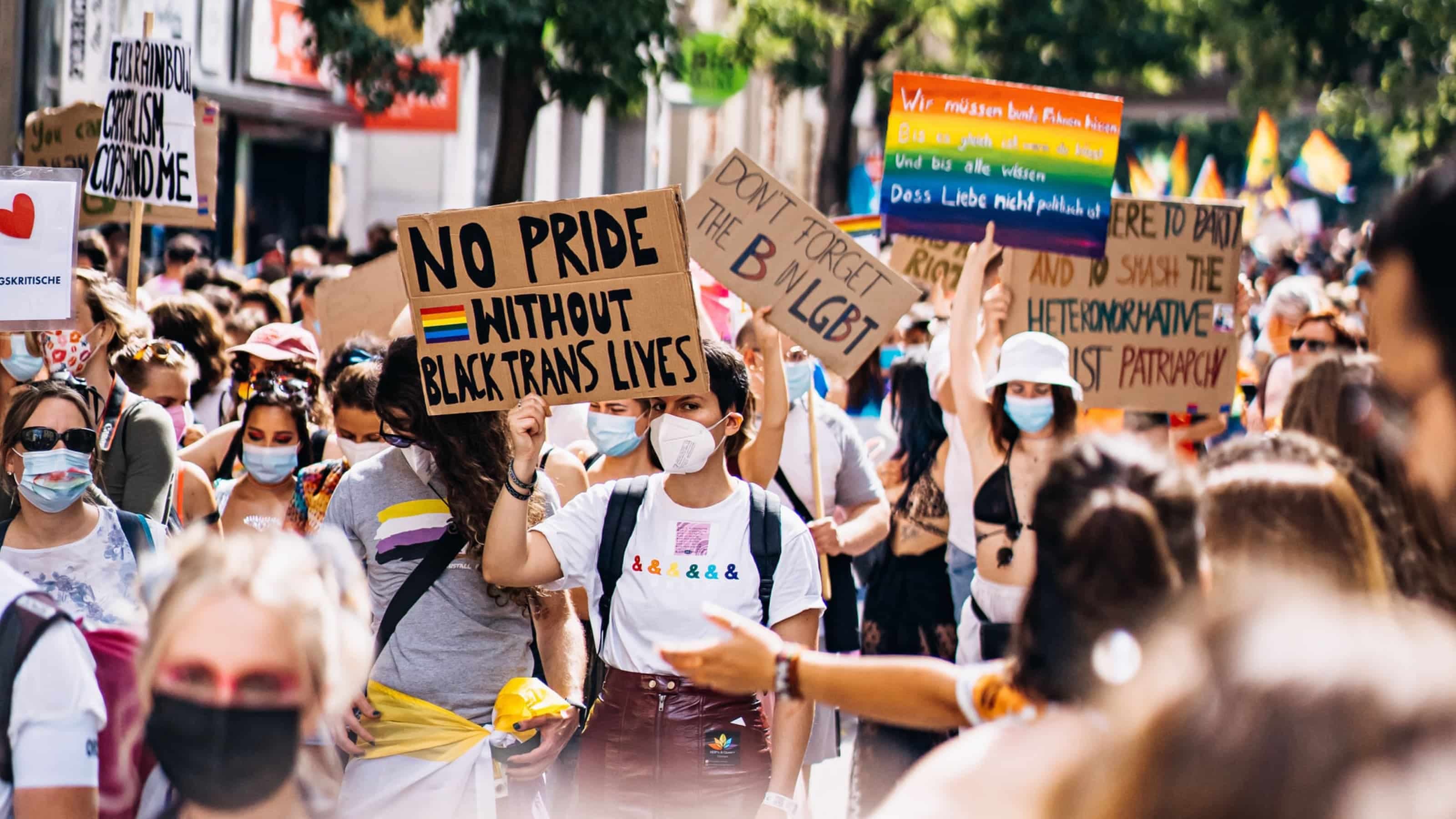To tackle the U-turn on banning conversion therapy, the LGBTQIA+ community must unite

The Guardian reported in April that trans people’s mental health is at crisis point in the UK. It’s no wonder, given that after five years of very public “debate” and assaults on our rights, the most recent instance was Boris Johnson’s announcement that the conversion therapy ban wouldn’t include trans people. “We will have a ban on gay conversion therapy, which to me is utterly abhorrent,” he said in April. “But there are complexities and sensitivities when you move from the area of sexuality to the question of gender. There, I’m afraid, there are things that I think still need to be worked out…”
Conversion therapy is the act of trying to change a person’s sexual orientation or gender identity; it can be physical, psychological or emotional – but what is consistent is that it is traumatising and abusive. People have campaigned for decades to have the practice banned, and all medical bodies in the UK, including the British Medical Association, are united in their view that the practice should not be supported. All forms of conversion therapy were expected to be banned in this announcement, so the U-turn for trans people came as a shock. However, tracking Johnson’s government’s treatment of trans people, it shouldn’t have been such a surprise.
The announcement followed a number of moves seen as hostile to trans people by his government, including its rollback of the Gender Recognition Act reform promise in 2020. Johnson’s treatment of trans people has had a detrimental effect on the UK’s reputation globally – including us falling down ILGA-Europe’s ranking of LGBTQIA+ friendly countries for the third year in a row in 2022, from 10th place to 14th. They named being a hostile environment for trans people as the reason.
So why is Johnson’s government attacking trans rights? To understand, we need to look at the broader political context of the past few years: Brexit, Trumpism, the rise of far right populism, political polarisation and culture wars. What is happening to trans people right now is about trans people but it also has nothing to do with trans people at all. In uncertain political times, our government is using marginalised groups as political footballs to build rhetoric for easier wins, whether it’s Liz Truss and BoJo on trans people or Priti Patel on immigration. Soundbites and policies are having devastating effects on our lives, but the purpose is to create division and increased social control.
The use of the word “complexities” in Johnson’s statement was no accident. Trans people in the UK are frequently referred to as a “complication” by politicians and the right-wing media, echo-ing Trump’s famous “trans people are a burden” tweet, in order to build popular support for his efforts to roll back the Affordable Health Act.
It is also eerily reminiscent of the public “debates” about the removal of Section 28 (a series of laws that prohibited the “promotion of homosexuality”) and gay adoption rights in the early 2000s. These revolved around the notion of how “complicated” LGBTQIA+ people are and how other values and norms need to be protected before our humanity. Such social narratives have been stoked by Conservative politicians for decades. The year before Section 28 came into effect, Margaret Thatcher said: “Children who need to be taught to respect traditional moral values are being taught that they have an inalienable right to be gay… All of those children are being cheat-ed of a sound start in life – yes, cheated.”
It’s interesting in 2022 that popular opinion recognises how abhorrent her statement and Section 28 were. But it’s a real challenge for us to build widespread recognition that Johnson’s government’s position on trans people is one and the same.
Reflecting on this has helped me make sense of two things: firstly, that BoJo is utilising the same playbook for moral panics used against women, Black people and other oppressed communities for decades, from women wearing trousers to jazz music causing miscarriages. Secondly, that we can and will win. There will come a time when it will be so abhorrent to most people that this moment in time ever happened.
Johnson’s attempt to separate trans conversion therapy from LGB conversion therapy is a pivotal moment for a cultural awakening on these strategies. His speech is being called out for what it is: a cheap attempt to drive a wedge into the LGBTQIA+ community, by giving some of the community rights at the cost of another section. It worked for the government ten years ago when negotiating the equal marriage bill – one of the clauses the gay rights lobby conceded to in pursuit of marriage was the spousal veto, which hurt trans people. But this time around the LGBTQIA+ community is standing together.
Stonewall, which has previously been no friend to trans communities, immediately responded to Johnson’s announcement. The next day, 105 LGBT organisations stood together and pulled out of the UK government’s first LGBT+ global conference Safe to Be Me, forcing it to cancel. It has become a pivotal moment for change. The LGBTQIA+ community is standing together to say that trans conversion therapy is no more a “complicated” issue in 2022 than repealing Section 28 was in 2003.
Learning from history isn’t just about looking back at how playbooks are used against us, but also how we’ve conceded in ways that have harmed us too. We should unify our struggle for a trans conversion ban around community-based responses like compensation for survivors rather than criminalisation of perpetrators.
LGBTQIA+ communities coming together in a shared understanding that those who seek to harm us are one and the same offers real hope in this moment. Ultimately, the way we build freedom in this moment is together. Looking at the rollback of Section 28 almost 20 years ago, it’s so stark how much progress we’ve made and how many dots we’ve connected within the LGBT-QIA+ movement. My hope for looking back in 20 years from now is that those dots are connected beyond LGBTQIA+ spaces to draw in everyone who seeks bodily autonomy: disabled people, pregnant people, Black folks and other people of colour, and of course, those of us who exist at the intersections. Freedom will come, and not only from banning the practices that harm us, but by building movements that unite the fight for bodily autonomy.

